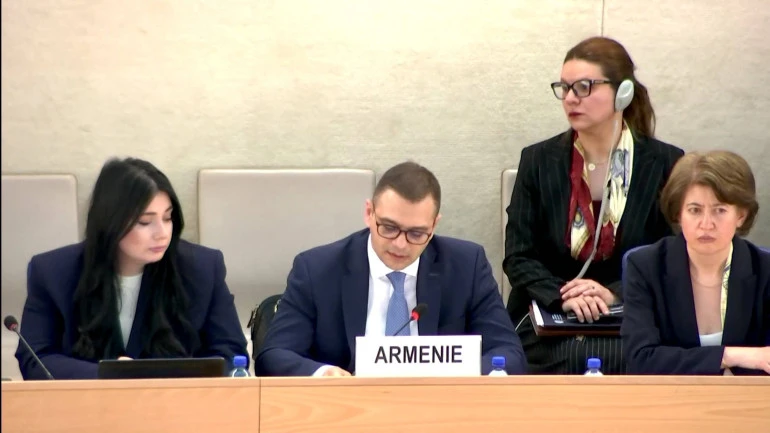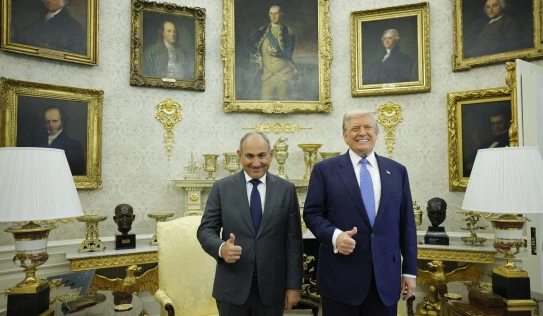RA Deputy Foreign Minister Robert Abyssoghomenian's speech within the 49th meeting of the 49th meeting of the Universal Periodic Monitoring Group.
"Mr. President,
Dear delegates,
It is a great honor and responsibility for me to lead the Armenian delegation in the fourth period of universal periodic monitoring. We appreciate this opportunity to address our progress and present future priorities in the spirit of constructive involvement.
We are proud to be here today with a representative delegation here, which testifies to Armenia's strong commitment to this process. Our delegation consists of Justice, Labor and Social Affairs, Education, Science, Culture and Sports, Environment and Health, as well as partners of the Ministries of Internal Affairs and Foreign Affairs.
Mr. President,
Armenia attaches great importance to the general periodic monitoring process, considering it not only as a platform for international dialogue and cooperation, but also an effective tool for national self-monitoring and human rights dialogue. The main advantage of this process is in its inclusion, as it goes outside the governments, involving a wide range of national stakeholders. In this spirit, Armenia has promoted participatory approaches during its universal periodic observation areas, contributing to the strengthening of the process as a member of the group of universal periodicals. 2023 In February, Armenia presented its third voluntary voluntary voluntary monitoring reports.
The fourth annual general monitoring report was prepared with the active participation of all interested ministries and departments and passed a public discussion process.
In order to control progress and ensure institutional coordination, Armenia has created a national mechanism for strengthening international accountability in the field of human rights and ensuring further steps arising from it. The national mechanism coordinated by the Ministry of Foreign Affairs serves as a centralized platform to make interdepartmental cooperation efficiently to ensure the systematic implementation and accountability of Armenia's international human rights obligations.
We have continued to work closely with the UN human rights system, including contractual bodies and special procedures.
Mr. President,
2020 Since our last monitoring, Armenia has faced unprecedented challenges, including world covid-19, and military attacks on military violence and military attacks on Armenia's sovereign territory. These have been deeply influenced by our population, testing Armenia's resistance and emphasizing the immediate need for comprehensive support to protect the most vulnerable groups. Despite these challenges, Armenia remained committed to the progress of its reform agenda, anchored on democracy, human dignity and the rule of law.
The report of the fourth round of Armenia presents the progress made in the third period of the third period. It details the legislative, institutional and political events, built on a number of thematic groups, each includes the main areas of reform.
In order to strengthen international obligations, Armenia has ratified a number of important documents on human rights, including the second optional protocols on the Rights of the Child and Disability Convention on the Rights of Persons, as well as the 13th Protocol to the European Convention. Apart from direct commitments, 2023 Armenia has ratified the Charter of Rome.
Within the framework of our continuing efforts to promote legal and judicial reforms, Armenia has adopted judicial and legal reforms 2022-2026. Strategy and its action plan consisting of 12 strategic goals. These reforms are focused on strengthening judicial independence, increase efficiency and promoting impartiality. All based on transparency and accountability principles. In this context, the addressing of the accumulated cases of the courts, in particular, was the main priority in the civil justice system. I am pleased to note that we have managed to achieve 80% reduction in accumulated civil cases. Another important development has been the improvement of alternative dispute resolution mechanisms, including 2023. The establishment of a fully incumbent international arbitration and motion center.
To provide stronger anti-corruption measures, Armenia has created a comprehensive framework that unites judicial, investigative and preventive institutions. Accepted 2023-2026. The next strategy for the fight against corruption has expanded the legal framework, which includes improvements in the Integrity Verification Mechanism and Asset Declaration System. Tangible results were registered in the alarm system. In addition, the mandate of the Corruption Prevention Committee and the control powers have been significantly strengthened, which allows more effective monitoring and accountability.
The Human Rights Strategy for Discrimination and the Protection of Human Rights and the Action Plan of the Action Plant is in the process of measurable indicators. National Action Plans and Target Strategies have been implemented, which address gender equality, children's rights, trafficking and people with disabilities. A draft law on equality and discrimination has been developed. The Human Rights Defender, which is an independent institution in Armenia, as the highest status of parisies, will operate as a body of equality.
Armenia has given priority to the implementation of sustainable development and inclusion of inclusive socio-economic development, such as education, health access, poverty reduction and digital connection. Investments have been invested in rural infrastructure, clean water and sanitation. Budgeting complying with gender issues was included in the main directions, and social protection schemes were strengthened to support the vulnerable population.
In accordance with the commitment of our country to promote civil and political rights, electoral processes have been amended to increase accessibility and transparency, including using international identification technologies in accordance with international standards. The legal provisions of the campaign financing have been clarified. 2024 Armenia ranks 43rd in the World Record of Freedom of the Press Freedoms of the Organization of the Freedom of the Republic of Armenia, climbing 2023. From the index of 49. Armenia has joined the Freedom of Online Coalition, reaffirming our strong commitment to digital rights and freedom of the press.
The fight against human trafficking was strengthened in 2023-2025. by the adoption of a national program. The services for victims of trafficking, such as emergency shelters, medical care and psychological care, have expanded and are now funded by the state. Budget allocations have been doubled for trafficking services since 2019.
The progress of economic, social and cultural rights is based on systemic reforms. Prioritized for free school food, inclusive education, distance learning platforms and large school and preschool construction. Reforms in the field of healthcare have expanded emergency medical care services to bring our country closer to universal health access. The labor legislation has been upgraded to promote decent work, ensure equal opportunities and all forms of compulsory labor.
Integration of gender policy in support of women's rights and gender equality has been included in national strategies and state budgeting. Reforms have been reformed on domestic violence, and support services have been expanded, including shelters and economic strengthening initiatives. The role of Armenia's Household Coalition Coalition has strengthened Armenia's leadership and technological inclusion efforts.
The implementation of the UN Security Council "Women, Peace and Security" Resolution 1325 is one of the national and international priorities of the government. Armenia has finalized "investment in peace in peace" for women, peace and security in its 2025-2027. The third plan of national actions. It is important to the National Development Strategies of Armenia and international obligations, while aimed at strengthening women's role in making peace and security, prevent gender-based violence and promote postsual recovery efforts.
The rights of persons with disabilities have been strengthened by the introduction of a new legal framework for the rights of the rights and the new system of assessment of the relevant functionality of the World Health Organization. The state-funded services, including personal assistance and inclusive education, have strengthened. Reforms to raise access and public awareness contribute to the increase in social participation and reduce discrimination.
In the field of children's rights, Armenia has developed a new draft law on the rights of the child and has expanded the range of family care options, including fostery and day care services. Institutional mechanisms to prevent early marriages have been improved to prevent children's protection and promoting inclusive education. The processes of justice in juvenile cases have been revised, and efforts have been made to make children's voice heard and protect them.
Mr. President,
Over the past four years, Armenia has faced many challenges. 2023 In September, as a result of the forced deportation of the entire population of Nagorno Karabakh, Armenia received more than 115,000 refugees in just a few days.
Armenia is taking all necessary steps to address these people's needs, particularly in the country's educational, social and health systems.
Armenia continues to draw attention to humanitarian issues, including missing, violent disappearances and Armenian prisoners of war in Azerbaijan. We emphasize the need for close cooperation and the need for international human rights and human rights to the addressing of the situation of the missing persons in determining the situation of the mentioned persons.
Mr. President,
During the reporting period, Armenia was also an active and principled participant in the global human rights processes. While a member of the UN Human Rights Council (2020-2022), Armenia has prioritized urgent issues, including genocide and mass crimes, to promote freedom of speech, and protection of minorities and the rights of vulnerable groups. We continue to play an active and principled role in international cooperation in the field of human rights, in particular, in the fight against discrimination and intolerance, as well as the prevention of genocide. Armenia has initiated December 9 as the procedure for remembrance of the victims of the Genocide and the International Day for the Prevention of This Crime, consistently submits consistently on the prevention of the Human Rights Council.
Armenia continues to adhere to the general periodic monitoring process and considers this dialogue a unique opportunity to cooperate with partners and mutual support. We realize that the promotion and protection of human rights is a continuous effort, and we are determined to cooperate with all the delegations and consider all the instructions received during this discussion.
Thank you. "


